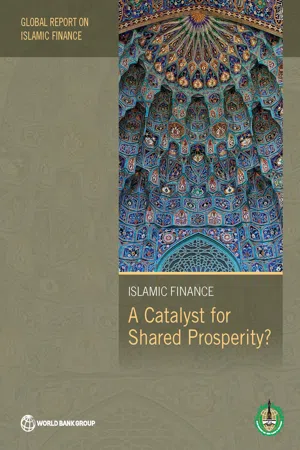
Global Report on Islamic Finance
Islamic Finance - A Catalyst for Shared Prosperity?
- English
- PDF
- Available on iOS & Android
Global Report on Islamic Finance
Islamic Finance - A Catalyst for Shared Prosperity?
About This Book
Income inequality has increased considerably in the aftermath of the financial crisis of 2007–08 to the extent that one percent of global population possess almost half of the global assets. Whereas the development community is unanimous to tackle growing inequality and imbalance in the distribution of wealth, there is a difference of opinion as to the approaches to achieve this goal. This report presents a perspective from Islamic finance on how shared prosperity can be enhanced. The theoretical framework for economic development by Islamic economics and finance is based on four fundamental pillars: (i) an institutional framework and public policy oriented to the development objectives of Islam; (ii) prudent governance and accountable leadership; (iii) promotion of the economic and financial system based on risk sharing; and (iv) financial and social inclusion for all, promoting development, growth, and shared prosperity. There is evidence that Islamic finance is experiencing high growth with the banking sector leading the way. Several countries are working seriously towards developing standards, regulation and legal frameworks for the development of Islamic finance. However, there are a number of aspects where policy interventions or improvements in policy effectiveness are needed to develop Islamic finance to promote shared prosperity. Without the enabling environment, Islamic finance may not be able to attain the potential expected of it. With adequate policy interventions and enabling financial infrastructure, Islamic finance could become a catalyst for alleviating poverty and inclusive prosperity. The key findings of the report include a need for sound regulatory framework for Islamic financial institutions due to the obvious differences from the conventional banks, harmonizing of Shariah standards and more discourse related to the underlying mechanism of Islamic financial products. Islamic capital markets both equity and Sukuk (Islamic bonds) are vital for the development of Islamic financial markets. Finally, instruments of Islamic social finance and redistribution could contribute further to enhance the shared prosperity.
Frequently asked questions
Information
Table of contents
- Cover
- Half Title
- Title
- Copyright
- Contents
- Foreword
- Acknowledgments
- Glossary
- Abbreviations
- Overview
- 1 Islamic Finance and Shared Prosperity
- 2 The State of Development and Shared Prosperity in OIC Countries
- 3 The Islamic Banking Sector
- 4 Islamic Capital Markets
- 5 Takaful (Islamic Insurance), Retakaful, and Microtakaful
- 6 Nonbank Financial Institutions
- 7 Alternative Asset Classes
- 8 Islamic Social Finance
- 9 Public Policy Measures to Enhance Shared Prosperity
- Chapter Attributions
- Index
- BOXES
- FIGURES
- TABLES